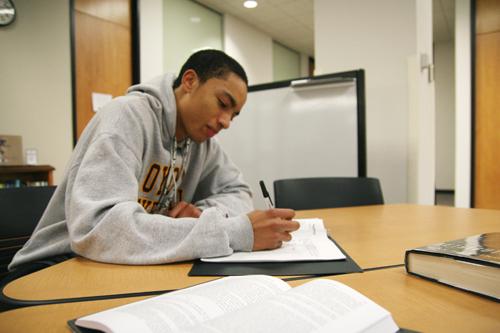The life of a student-athlete calls for valuable time management and good study habits to balance 20 hours a week of excelling on the court or field in games and practices along with homework, quizzes, papers, and tests.
Ideally, those who possess skills that college coaches search for are recruited to become members of the various athletic teams such as basketball, volleyball, and baseball. An athlete can possess such skills that allow them to play college sports, but there are certain requirements athletes must meet to be considered a student-athlete.
In order for athletes to compete in any sport in the National Association of Intercollegiate Athletics, they must maintain a cumulative grade point average of at least a 2.0 following their sophomore year. If athletes don’t meet those requirements during their freshman year, there is a year-grace period during which athletes must take the necessary measures to improve their academic performance. If the problem persists beyond sophomore year, the NAIA places students on probation and suspends them from the team until the GPA meets requirements.
Coach Giorlando complies with the standards of the NAIA, but places his own personal expectations on his athletes to compete at a high level in sports as well as transcending past the academic standards of the NAIA.
“As head coach and athletic director here at Loyola I believe that there should be an individual goal of achieving a 3.0 or higher,” Giorlando said, “but all we require them to do is put-forth their best effort on the table.”
One of the things Coach Giorlando emphasizes is the value of receiving an education and earning a degree from Loyola University, but according to him, it’s the players who put more of a requirement on themselves to attain a 3.0 or higher. The athletes, here over his tenure as head coach, “have built a culture” of striving to achieve academic excellence and often times “it becomes a positive peer pressure” in which neither one of the athletes want to let each other down, Giorlando said.
Last season the basketball team collectively achieved the highest cumulative GPA in the entire NAIA division earning a 3.4. Three former Loyola athletes, A ‘07 Mario Faranda, A ‘07, Carter Wurts, and Luke Zumo, A ‘07, have been given the honorary title of a “scholar-athlete”. The NAIA recognizes those juniors and seniors who have attained a 3.5 GPA while participating in athletics. Over the past years, coach Giorlando has come to expect his players, as well as other Loyola athletes to have some of the highest grade point averages in their conference.
As difficult as it is to maintain that level of excellence he encourages, he believes in its attainability because of the players Loyola coaches recruit. Loyola University’s prestige is a valuable recruiting tool to attract student athletes who desire to play sports, but understand the importance of earning a degree.
“Parents look for universities where the academic component is a big part of the equation of success for the next four years,” Giorlando said.
Torry Beaulieu, history junior, serves as evidence that athletes are attracted to Loyola because of the educational opportunity that is presented to them.
“I think a lot of the players chose Loyola because of the educational side, not just the athletics. The school carries a great name and the credibility that the school has attracts us because we look forward to graduating with a degree from Loyola so we may be successful in whatever we do,” he said.
People may wonder how these student-athletes balance multiple hours of practice and games with studying for tests and doing homework, but the answer is picking up effective study habits and building a stable foundation early.
“When we first came to college as freshmen, the coaching staff did a good job of making us go to study hall to learn how to organize our activities wisely, adjust to the college life, and manage our time effectively throughout our college career,” Beaulieu said. “Now, we can use what we learned freshman year to decide how much time we need to put aside for studying.”
All incoming freshman and transfer basketball players are required by Coach Giorlando to spend a minimum of eight hours per week in study hall. Freshmen have to go to the sports complex where they sign in and out with an assistant coach to make certain that they meet the requirements each week. They meet with the coaching staff, as well as Giorlando, to express any concerns they have and to discuss schoolwork.
Giorlando fulfills his duties as the head basketball coach teaching them the fundamentals of basketball, but that’s not the only thing. According to Chris Joseph, political science freshman, the coach doesn’t just say they should do well in school- he works with them and gives them the tools that they need to be successful in the classroom all throughout college.
“Coach not only stresses that we can succeed, but he shows us how we can succeed. He tells us to do A, B, and C, and sometimes we really don’t believe him, but we try some of those things and receive an A in the class or a better grade than what we had before,” said Joseph, who often cites former scholar-athlete Zumo, as an example playoff the attainability of a high GPA while playing a sport.
Giorlando requires the freshmen to devote eight hours each week toward studies because “it is the process of finding time to take care of their responsibilities, handling all the ups and downs of the college life. (Study hall) allows them to stay focused and handle diversity.
When it is all said and done, they can look back at the their college careers and be proud.”
Craig Malveaux can be reached at camalvea@loyno.edu.






